-
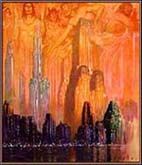 Vicente Segrelles
was born in Barcelona (Spain) on September 9, 1940 during the postwar
period after the Spanish Civil War. His childhood lapsed in a peculiar
atmosphere: his father loved paintings and inventions, and his uncle,
José Segrelles, had international prestige as illustrator
and watercolorist. This atmosphere influenced his innate passion
to drawing, to which he dedicated any free moment, and just inclined
him towards illustration. Vicente Segrelles
was born in Barcelona (Spain) on September 9, 1940 during the postwar
period after the Spanish Civil War. His childhood lapsed in a peculiar
atmosphere: his father loved paintings and inventions, and his uncle,
José Segrelles, had international prestige as illustrator
and watercolorist. This atmosphere influenced his innate passion
to drawing, to which he dedicated any free moment, and just inclined
him towards illustration.
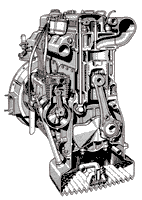
But at that time things were not easy, specially to take a risk
with such a uncertain business as art was, so at fourteen he entered
in the training school of ENASA, the factory of trucks from Barcelona
that produced Pegaso. There, a kind of high school focused towards
technical specialisation, he learnt mechanics, technical drawing
and knowledge of materials. At seventeen years old he was already
draughtsman and soon he passed to the department of technical publications
of ENASA, where catalogues of instructions and replacement pieces
were carried out. Segrelles contributed with new ideas, completely
revolutionising the artistic concept of publications, and was soon
well-regarded by his superiors. Anyway, the job did not yet satisfied
Segrelles, still in love with illustration, although it provided
him with great ease in perspective, line drawing and other matters
that would be very useful to him in the future.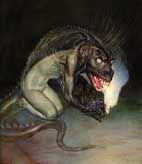
At the same time, Segrelles had been continuing his self-taught
formation in artistic drawing, to which he dedicated any spare time.
He experienced with different art techniques (watercolor, Chinese
inks, gouache, oil treated as watercolor and so on) and prepared
samples. It was by 1960 when he got in touch for the first time
with professional illustration through Afha Editorial, to whom he
illustrated Homer's Odyssey and Iliad.
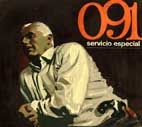
Finally, at 23 years old he left ENASA and, through a press advert,
he entered in Ruescas McCann Erikson, a publicity agency in Barcelona,
as a figure and colour specialist. One year later, he moved to another
agency in Zaragoza as designing director. He lived in Zaragoza for
several years, there he married and had the first of his two daughters.
But his inclination towards illustrations moved his to look for
new matters and by 1968 he contacted with Editorial Bruguera, in
Barcelona. By correspondence, he made for them several collections
of coloured prints and also illustrated some books. In 1969 he contacted
with an artists' agency called Selecciones Ilustradas and initiated
collaboration with a series of illustrations on western weapons.
This meant for Segrelles the discovery of a new world, the world
of international, elite illustration. By 1970 he finally decided
to abandon publicity and devote exclusively to illustration.
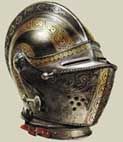
By that time he retook his collaboration with Editorial Afha, illustrating
many reference books for several years. He also wrote some of these
books, since they dealt about topics he is very fond of: inventions,
ships, airplanes, weapons and so on. Most of the publishing business
in Spain was located in Barcelona, so in 1974 he decided to come
closer and settled down in a small seaside town 50 km far from the
capital, where his second daughter was born and where he still lives.
By 1976 and 1977 he collaborated with a recent magazine from Barcelona,
INTERVIÚ, creating B/W illustrations for their articles during
30 issues.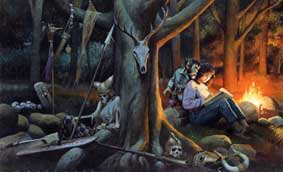
At the same time, Segrelles continued his career as a book cover
illustrator, firstly through Selecciones Ilustradas and later through
Norma Agency. He specialised in fantasy and science fiction topics,
though he also painted covers on western, terror, war and detective
stories. By mid seventies, while he was already affirmed in Europe,
Segrelles entered the severe North American market and began producing
illustrations and covers for the best publishing houses in the USA.
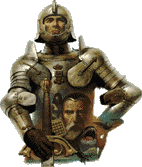
In 1980, attracted by comics, Segrelles created THE MERCENARY, a character who reported him world-wide reputation
and was even praised by film director Federico Fellini. Painted
in oils and published in 14 countries, THE MERCENARY was a beautiful
fantasy comic-book in full colour that evidenced all  his experience
and hobbies. Little by little, he spent more and more time in graphic
novels so early on nineties he discontinued his work on book covers
to fully devote to THE MERCENARY. However in 1991 he briefly tackled
comic cartoons with two volumes of a new character, SHERIFF PAT. Tired of time-consuming oil technique, Segrelles decided
in 1998 to try on with computers for the creation of his graphic novels. Some images
made with this tool were finally included in the tenth volume of
THE MERCENARY series, GIANTS. Subsequent volumes of the series,
which reach now book 13 with THE RANSOM II, have been completely
created with computers. his experience
and hobbies. Little by little, he spent more and more time in graphic
novels so early on nineties he discontinued his work on book covers
to fully devote to THE MERCENARY. However in 1991 he briefly tackled
comic cartoons with two volumes of a new character, SHERIFF PAT. Tired of time-consuming oil technique, Segrelles decided
in 1998 to try on with computers for the creation of his graphic novels. Some images
made with this tool were finally included in the tenth volume of
THE MERCENARY series, GIANTS. Subsequent volumes of the series,
which reach now book 13 with THE RANSOM II, have been completely
created with computers.
In 1999 Segrelles published an ART HANDBOOK
explaining many of the secrets of professional illustrators. The
complete
series was finally reissued under his own imprint in
the Spanish language in Summer 2004. On the other hand, Segrelles
has just ventured in the field of children's books with an illustrated
tale entitled THE
MAGIC WATER, which he has also written and was published
by Ediciones B in Autumn 2004. The amazing story has been illustrated
with computer tools but in a different style from THE MERCENARY.
|
 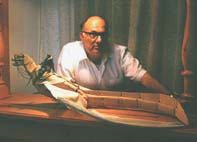
- At his spare time, Segrelles uses mud to make figures
of nudes, warriors, dragons and so on. He also loves making scale
models starting from scratch, of boats, airplanes and castles. Among
his scale models there is an aluminium airplane Messerschmit 109
of one meter long which he made from the manufacturer plan found
in a book, with its timbers, its retractable landing gear with suspension
in the wheels and many other details; a 1,60 m high model of Columbus'
ship, la Santa María, where even pulleys work and guns shoot;
a wooden articulated flying dragon; a model of more than two square
meters for electric trains with a small castle, etc.
-
|



